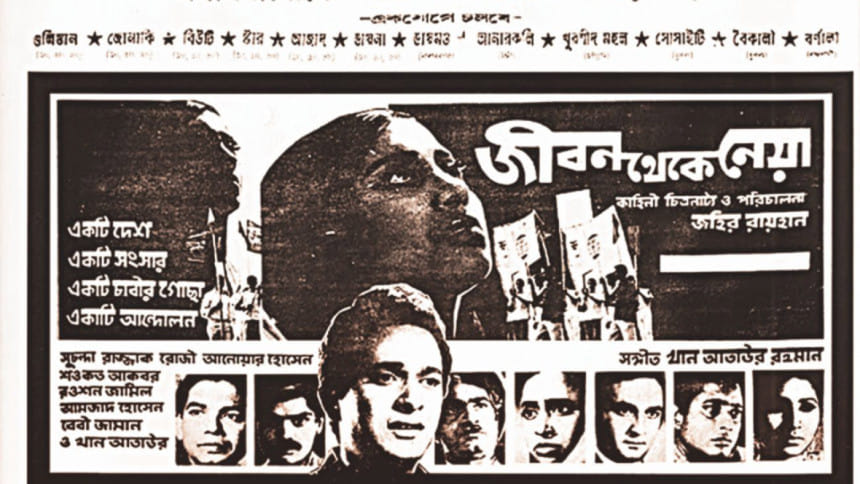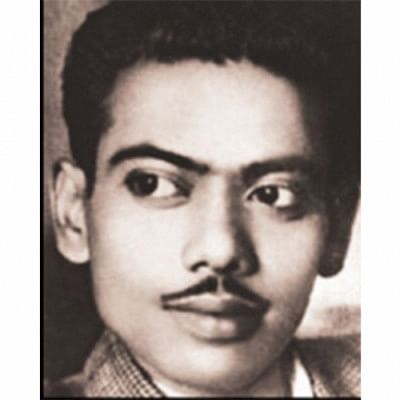Zahir Raihan and the making of Jibon Thekey Neya


Being someone who is keen on watching films that were made on our Liberation War in the early seventies—and the films that made an impact on our nation's movement for freedom—for me, Zahir Raihan is a legend. And whenever there is any discussion on Zahir Raihan—who had an unparalleled passion for films and documentaries alike—I make it a point to talk about Jibon Thekey Neya. As an ordinary viewer, I think this particular film was meant for all the people of Bangladesh. Such is this film's specialty.
When Jibon Thekey Neya, the last feature film directed by this legendary filmmaker, was released on April 10, 1970, it took the whole of East Pakistan by storm. The people of East Pakistan knew beforehand that a film was being made which spoke of their story, their struggles, and their dreams. They had a feeling that the film might not get clearance from the censor board and so they brought out a procession protesting any such move. Finally, the film was released. But on the day of its release, the then military government banned it. The next day, the censor board again arranged for its screening, where Major General Rao Forman Ali himself was present and watched the whole film. Although the film got clearance from the censor board after the screening, Rao Forman Ali warned Zahir Raihan, "… I will see you."
Why this warning? The film narrates the story of a middle class family headed by an autocratic elder sister. Other members include her two younger brothers and her husband. But nobody in the family has a say in any matter of the household and everything is decided by the elder sister. Her husband is not even allowed to sing inside the house. In such a suffocating environment, to end her autocratic rule, the two brothers get married hoping that their elder sister would not be able to dictate everything in the family anymore. The members of the family paste posters on the wall against her dictatorship. In the end, the oppressed members win and the autocratic elder sister lands in jail.
Although it seems like the ordinary story of a family, it symbolises the dictatorial regimes of Ayub Khan and Yahya Khan. The whole family's struggle against one woman symbolises the struggle of the people of then East Pakistan. The film drew inspiration from the Language Movement of 1952 and the mass uprising of 1969. Our Language Movement had always been a source of inspiration for Zahir Raihan. He was among the first ten students of Dhaka University to break Section 144 on February 21, 1952 and was jailed for his role in the Language Movement. Raihan planned to make a film on the movement, but could not get the government's approval. In Jibon Thekey Neya, Zahir Raihan kept scenes of Probhat Pheri on February 21; the protagonists of the film were seen observing Ekushey February. The political consciousness of the characters in the film encouraged, and added to, the nationalist movement of that time.
I still find it hard to believe that this film, which challenged state power and echoed the hopes and aspirations of the people of then East Pakistan, was actually made in 1969, the year of the mass uprising. During the shooting of the film in FDC, some army men came to the spot. They said they heard an anti-Pakistan film was being made by Zahir Raihan. They picked up Raihan and actor Razzak for interrogation, and only let them go after Raihan signed a bond which said if the law and order situation in the country deteriorates after the film's release, Zahir Raihan would be held accountable.
A film like Jibon Thekey Neya was a big challenge for Raihan in every aspect of its making. Prior to this, he had made quite a number of feature films among which were Kokhono Asheni, Kacher Deyal, Behula, Anowara, etc. All of these were much acclaimed by film critics. Kacher Deyal was a huge success and got Raihan international recognition. But he wanted to move away from making popular and commercially successful films and wished to make political films instead. This came about with Jibon Thekey Neya.
He made it in a way so that ordinary people could easily relate to the story. Amzad Hossain and Zahir Raihan jointly wrote the screenplay. Afzal Chowdhury did the cinematography, while Khan Ataur Rahman gave the music direction. The combination of the four was extraordinary and thus, we got an extraordinary film. During our Liberation War, this film was a hit in Kolkata and had earned a lot of money, all of which Zahir Raihan donated to the Liberation War fund.
Ask any ordinary person to name a film from the 1970s that they remember watching; the answer would definitely be Jibon Thekey Neya. I remember watching this film with my parents when I was a child. I particularly loved the song Ey Khacha Bhangbo Ami Kemon Korey, which Khan Ataur Rahman sings a number of times in the film but is never able to finish singing. Khan Ataur Rahman later said that the song was never finished in the film because people's struggle to break free from the shackles of oppression never ends—it's a continuous process.
This is also true for Zahir Raihan, who, in his short lifetime, struggled continuously for realising his dreams. He struggled through his films and writings. He struggled for a country where there would be no place for war criminals. He was the first person after our independence to form a commission to investigate the killings of intellectuals. His lifelong struggle ended with his disappearance on January 30, 1972.
Naznin Tithi is a member of the editorial team at The Daily Star. This article was originally published on August 19, 2017 in The Daily Star.

 For all latest news, follow The Daily Star's Google News channel.
For all latest news, follow The Daily Star's Google News channel. 



Comments